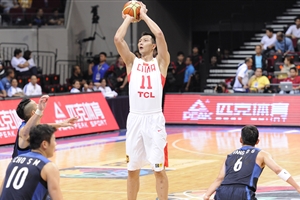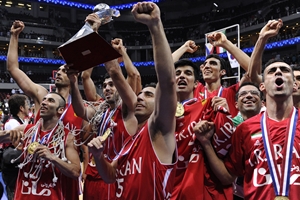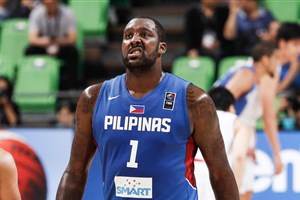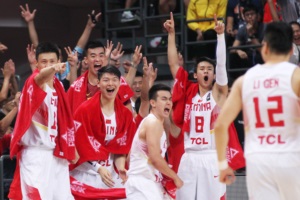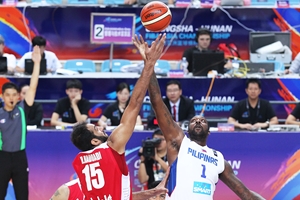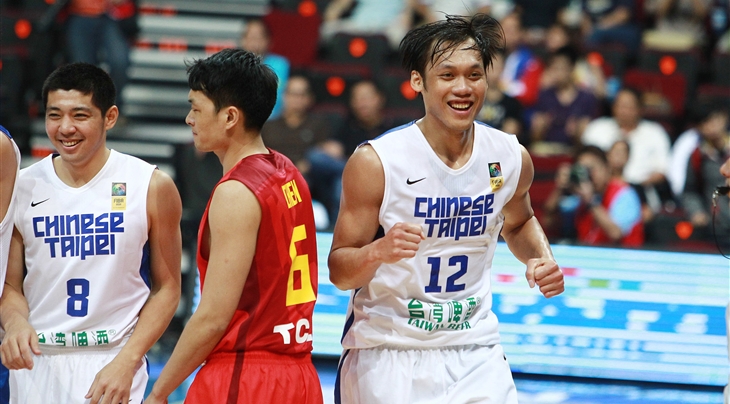
2015 FIBA Asia Championship Preview - Group D
CHANGSHA-HUNAN (2015 FIBA Asia Championship) - In the lead-up to the 2015 FIBA Asia Championship taking place in Changsha-Hunan from 23 September-3 October, we take a look at each of the four groups.
Here's a look at Group D.
CHINESE TAIPEI
Preparation period: Chinese Taipei's only pro hoops circuit, the Super Basketball League, ended its season on April 7. Returning national team coach Chou Jun-San replaced incumbent head coach Hsu Chin-Tse, who begged off due to health reasons, in May and didn't waste much time before calling up his players for training. The team had a three-game trip to Korea, where they played Korea's national pool twice and one KBL club team. They also participated/hosted the 2015 William Jones Cup, finishing third behind Iran and the Philippines. They flew to Manila last week for the 2015 MVP Cup, losing all three games, even one to a PBA club team. Most everyone looks healthy, save for speedy swingman Jet Chang, who's sidelined by an injury he sustained in the Jones Cup.
Star player: Lin Chih-Chieh was named to the All-Star Five at the 2013 FIBA Asia Championship in Manila, where he averaged 10.7 points, 4.9 assists and 3.8 rebounds per game. Even at the relatively advanced age of 33, he remains a vital cog in Chinese Taipei's hopes and he will surely carry much of the burden of leading this team once again. Lin is listed as a guard-forward, but what he really is is this team's primary playmaker. About 90 percent of the time, the possession will go through Lin and it won't be any different in Changsha, Hunan.
Strengths and weaknesses: Lin can expect a lot of support, especially from naturalised center Quincy Davis, who plugs this team's traditional weakness in the middle. Fellow veterans Tseng Wen-Ting and Tien Lei should provide huge lifts for the squad too, while up-and-coming player Liu Cheng is projected to be a ball of energy. Guys like Lu Cheng-Ju and Hung Chih-Shan will spread the floor, which should help offset this team's size disadvantage when ranged against the tourney’s bigger squads.
KAZAKHSTAN
Preparation period: Division 1 of the Kazakhstan pro league ended in April and head coach Vitaliy Strebkov didn't waste much time calling up his troops for the national pool, pulling in the members of 2014 Asian Games squad, sprinkled with other top players from the Kazakh league. They had a two-game tune-up series with the Xinjiang Tigers of the Chinese Basketball Association (CBA) and won both contests. A few weeks ago, they also flew to Lithuania for more training and tune-up games. Having a healthy Jerry Johnson back in the team was also a major positive step in preparation for the 2015 FIBA Asia Championship.
Star player: Anatoliy Kolesnikov will be playing in the FIBA Asia Championship for the first time but he won't be a stranger to many teams as he already turned a lot of heads at the 2014 Asian Games. He averaged 13.9 points and 8.1 rebounds per outing in that competition, helping Kazakhstan finish among the top four despite having to go through the qualifying phase. Kolesnikov is a versatile forward who can hurt opposing teams in many ways and he is expected to have a breakthrough performance this year.
Strengths and weakness: With six players standing 2.00m or taller, coach Strebkov has the size to be able to match up well with big teams like China or Iran. This is also complemented by a skilled corps of guards and wingmen, led by Johnson, streak shooter Pavel Ilin and veteran playmaker Rustam Yargaliev. Perhaps what will endanger Kazakhstan's chances is inconsistency, which they displayed two years ago in Manila.
LEBANON
Preparation period: Lebanon certainly want to regain their place among the top teams in Asia. Things, however, haven't gone according to plan. They had a brief trip to Europe for some tune-up games, but other than that there hasn't been much exposure for the team. The Lebanese were also supposed to go to Manila for the MVP Cup but they backed out at the 11th hour to join another pocket tournament in China. However, that venture didn't materialise either. By far the biggest blow to their cause, however, has been the news that living legend Fadi El Khatib won't be able to suit up for the team.
Star player: With El Khatib out of the picture, the time is ripe for a new generation of stars to step in and step up. Lebanon reportedly signed Loren Woods to be their naturalized player for Changsha, but his age and health eventually forced the team to replace him with Jasmon "Jay" Youngblood, who has played in Lebanon's pro league and actually played for the Cedars in the 2015 West Asia qualifying tournament. Youngblood is a solid wingman who can play three positions and is a threat from practically anywhere on the floor. At his best, he can carry this team on his shoulders against even the toughest contenders in Asia.
Strengths and weaknesses: In an ideal world, Lebanon should be led by, among others, El Khatib and half-Australian center Julian Khazzouh. Things, however, have been far from ideal for the beleaguered Cedars and they will be forced to make do with the team they have currently assembled. It is still a formidable squad, but, given the strength of the other teams in their preliminary group, Lebanon may not make it out of Group D. If coach Veselin Matic's charges manage to punch a ticket to round two, though, they will have a very tough time going deeper in the tournament. Guys like Wael Arakji, Amir Saoud and Ali Haidar may provide some glimpses of greatness, but inexperienced playmaking and holes in the frontline may eventually put them a notch below the elite.
QATAR
Preparation period: Qatar had a three-step plan for their FIBA Asia Championship preparations. They went to Lithuania for their first training camp before heading to Manila for a series of tune-up games against PBA clubs. One main thing that basketball fans tried to keep tabs on was who would be this team's naturalised player. They had former NBA player Jarvis Hayes in 2013 and employed veteran Boney Watson last year at the Asian Games. Many expected Watson to reprise his role this year, but the Qatar Basketball Federation (QBF) went with another old reliable instead - Trey Johnson. Johnson already donned the Qatari colors in 2012 for the FIBA Asia Cup in Tokyo, where Qatar won three of seven games and finished in third place. He is expected to have an even bigger role this year, especially since Qatari icon Yasseen Musa has officially retired from 5on5 international hoops.
Star player: Twenty-eight-year-old Khalid Suliman Abdi should be among Qatar's leaders in the FIBA Asia Championship. Two years ago, he played mainly as a reserve, averaging 5.0 points and 2.8 rebounds, while, at the 2014 Asia Games, he took on a bigger role, shooting 60.0 percent from the field and 36.4 percent from three-point range en route to a team-high 15.0 points per game. With Johnson playing mostly as a combo guard, Abdi should retain his spot as the team's #1 wing threat. At 1.98m, he is bigger than most Asian guards and is quicker than most Asian forwards - that's a combination that he should naturally exploit.
Strengths and weaknesses: Qatar have a great balance of size, mobility, and shooting. They are laden with veterans like Mohammed Yousef and Daoud Musa Daoud, but they also have a couple of young guys to watch out for, most notably Yehia Abdelhaleem and Saad Abdulrahman Mohamed, both of whom played in the 2014 FIBA Asia U18 Championship. This team would have been a shoo-in for the Quarter-Finals had it been in another group, but, as things stand, the Qataris are in for a royal rumble in the Group of Death. As long as Al Annabi don't play below their potential, though, they should be among the teams advancing to the second round and maybe even beyond.
FIBA




